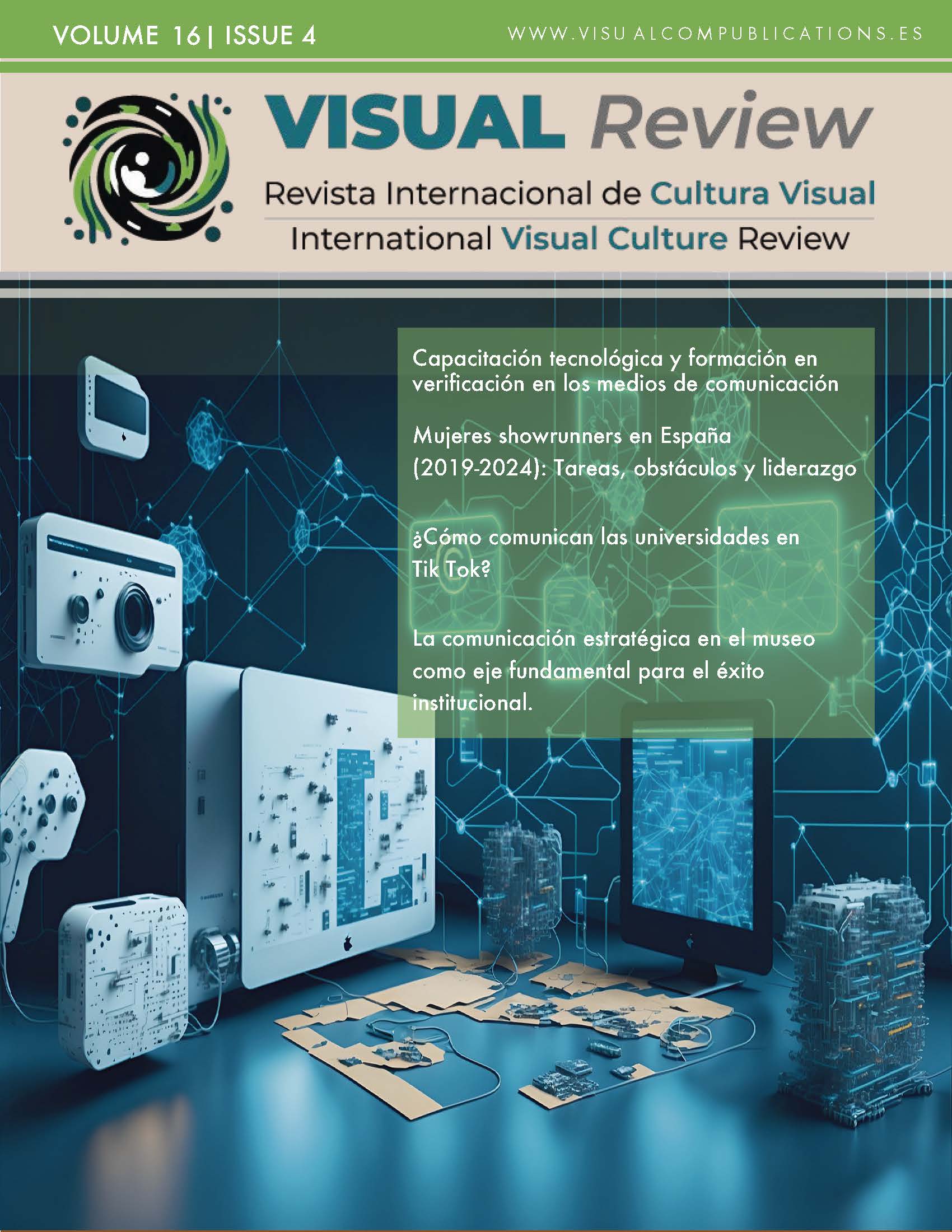Cultura de alfabetización digital y audiovisual entre los estudiantes universitarios
DOI:
https://doi.org/10.62161/revvisual.v16.5315Palabras clave:
alfabetización, digital, cultura, estudiantes, estudiantes universitarios, medicinaResumen
En la era contemporánea, la alfabetización digital se ha convertido en un imperativo ineludible, y los estudiantes universitarios forman parte de la generación que ha crecido inmersa en el mundo digital. El objetivo era analizar la cultura de la alfabetización digital en los estudiantes. Se siguió un estudio descriptivo, observacional y transversal, la muestra fue de 320 estudiantes, resultando la actitud en relación a las tecnologías buena debido a la familiaridad de su uso. El uso de las TIC representa un apoyo inestimable para los estudiantes al facilitarles la investigación enel ámbito científico y médico.
Descargas
Estadísticas globales ℹ️
|
658
Visualizaciones
|
276
Descargas
|
|
934
Total
|
|
Citas
Aguila, R. P., de Oca Montano, J. L. M., & Martínez, A. H. (2023). Biomedical indexing: its thesauri, databases and thematic representation of specialized literature content. University Library, 26(1), 315-322. 10.37467/revvisual.v15.5161
Ayabaca, D. M. G., Alba, J. A. J., & Guamán, E. (2019). Implementation of ICT in the Ecuadorian educational environment. Sociedad y tecnología, 2(2), 45-53. https://doi.org/10.51247/st.v2i2.49 DOI: https://doi.org/10.51247/st.v2i2.49
Barrios-Ouiroz, H., & García-Contreras, R. (2022). Higher Education: Competencies to Respond. Ciencia y Sociedad, 47(2), 21-40. https://doi.org/10.22206/cys.2022.v47i2.pp21-40 DOI: https://doi.org/10.22206/cys.2022.v47i2.pp21-40
Carrillo, E. R., Godinez, V. B., González, L. E. V., Corona, A. G. R., Morán, J. A. L., Alcántara, I. J. P., & Godínez, E. M. B. (2021). Factors associated with the use of information and communicationtechnologies in family medicine residents. Spanish Journal of Medical Education, 2(2).
Castaño Marcos, E. (2022). Audiovisual literacy: manipulation through the media. ICONO 14, Revista de comunicación y tecnologías emergentes, vol. 21(2). https://doi.org/10.7195/ri14.v21i2.2028 DOI: https://doi.org/10.7195/ri14.v21i2.2028
Cervantes-López, M. J., Peña-Maldonado, A. A., & Ramos-Sánchez, A. (2020). Use of information and communication technologies as a support tool in the learning of medical students. CienciaUAT, 15(1), 162-171. https://doi.org/10.29059/cienciauat.v15i1.1380. DOI: https://doi.org/10.29059/cienciauat.v15i1.1380
Espeja, D., & Lázzaro, L. (2022). Public policies on Communication and Education. The challenge of the pandemic21. Published in 2022 by the United Nations Educational, Scientific and Cultural Organization (UNESCO), 7, place de Fontenoy, 75007 Paris, France and Defensoría del Público de Servicios de Comunicación Audiovisual de Argentina, Adolfo Alsina 1470-CP 1088-CABA,
Buenos Aires, Argentina.
Fernández, H. M. (2023). Development of Reading Comprehension in English Using the Think-Pair- Share Technique. Fermentum, 33(98). http://www.saber.ula.ve/handle/123456789/49720
García García, J. J., Moreno Altamirano, L., & Flores Ocampo, A. E. (2020). Action research as an educational strategy for obtaining significant learning in health promotion in public health in students of the Faculty of Medicine of the UNAM. Investigación en educación médica, 9(36), 41- 51. 10.22201/fm.20075057e.2020.36.20228 DOI: https://doi.org/10.22201/fm.20075057e.2020.36.20228
García-Ruiz, R. (2023). Media and digital literacy in the curriculum. Transformative didactic proposals. Comunicar, 43(22),15–23. https://doi.org/10.3916/C43-2014-01 DOI: https://doi.org/10.3916/C43-2014-01
Guajala, L. P. T., Ordoñez, A. G. T., Castillo, J. E. A., Avelino, E. I. M., & Pérez, V. L. Z. (2021). Implications of the constructivist model in the educational vision of the 21st century. Society and Technology, 4(S2), 364-376. https://doi.org/10.51247/st.v4iS2.157 DOI: https://doi.org/10.51247/st.v4iS2.157
Hernández, D. J., Sánchez, P. M., & Giménez, F. S. S. (2021). La Competencia Digital Docente, una revisión sistemática de los modelos más utilizados. RIITE Revista Interuniversitaria de Investigación En Tecnología Educativa, 105-120. https://doi.org/10.6018/riite.472351 DOI: https://doi.org/10.6018/riite.472351
Hidalgo Cajo, B. G., Medina Pérez, V. H., Bonilla Acán, J. R., & Medina Gavidia, E. P. (2019). Use of information and communication technologies in the teaching of medicine in higher education. Atlante Cuadernos de Educación y Desarrollo, (March).
https://www.eumed.net/rev/atlante/2019/03/tecnologias-informacion-medicina.html
Largo-Taborda, W. A., López-Ramírez, M. X., Guzmán Buendía, E. M., & Posada Hincapié, C. A. (2022). Colombia and an education in emergency: innovation, pandemic and ICT. Actualidades Pedagógicas, 1(78), 3. https://doi.org/10.19052/ap.vol1.iss78.3 DOI: https://doi.org/10.19052/ap.vol1.iss78.3
Montenegro, S., Raya, E., & Navaridas, F. (2020). Teachers' perceptions of the effects of the digital divide in basic education during Covid-19. International Journal of Education for Social Justice, 9(3), 317-333. https://doi.org/10.15366/riejs2020.9.3.017 DOI: https://doi.org/10.15366/riejs2020.9.3.017
Oberländer, M., Beinicke, A., & Bipp, T. (2020). Digital competencies: A review of the literature and applications in the workplace. Computers & Education, 146, 103752. https://doi.org/10.1016/j.compedu.2019.103752 DOI: https://doi.org/10.1016/j.compedu.2019.103752
Parra, C. R., & Balanza, M. T. V. (2020). Intercultural communication, information society and ecitizenship. In “Teaching multiple competencies with intercultural perspective through virtual learning environments: the e-Levels project” (pp. 45-52). Aula Magna.
Ramé López, J. (2021). Audiovisual literacy at school: a case study. REIDOCREA, 10(31), 1-15. http://hdl.handle.net/10481/70945
Descargas
Publicado
Cómo citar
Número
Sección
Licencia
Derechos de autor 2024 VISUAL REVIEW. International Visual Culture Review / Revista Internacional de Cultura Visual

Esta obra está bajo una licencia internacional Creative Commons Atribución-SinDerivadas 4.0.
Los autores/as que publiquen en esta revista aceptan las siguientes condiciones:
- Los autores/as conservan los derechos de autor.
- Los autores/as ceden a la revista el derecho de la primera publicación. La revista también posee los derechos de edición.
- Todos los contenidos publicados se regulan mediante una Licencia Atribución/Reconocimiento-SinDerivados 4.0 Internacional. Acceda a la versión informativa y texto legal de la licencia. En virtud de ello, se permite a terceros utilizar lo publicado siempre que mencionen la autoría del trabajo y a la primera publicación en esta revista. Si transforma el material, no podrá distribuir el trabajo modificado.
- Los autores/as pueden realizar otros acuerdos contractuales independientes y adicionales para la distribución no exclusiva de la versión del artículo publicado en esta revista (p. ej., incluirlo en un repositorio institucional o publicarlo en un libro) siempre que indiquen claramente que el trabajo se publicó por primera vez en esta revista.
- Se permite y recomienda a los autores/as a publicar su trabajo en Internet (por ejemplo en páginas institucionales o personales), una vez publicado en la revista y citando a la misma ya que puede conducir a intercambios productivos y a una mayor y más rápida difusión del trabajo publicado (vea The Effect of Open Access).














